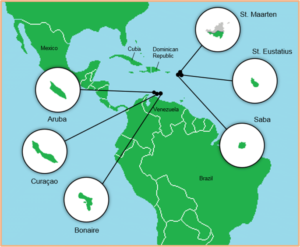|
Getting your Trinity Audio player ready...
|
Reading Time 3 mins
May 20, 2024
Yvon van der Pijl & Francio Guadeloupe (eds.), Equaliberty in the Dutch Caribbean: Ways of Being Non/Sovereign. New Brunswick NJ: Rutgers University Press, 2022. x + 202 pp. (Paper US$34.95)
[A chapter] discusses the 1969 Trinta di Mei labor uprising in Curaçao influenced by the U.S. Civil Rights Movement and immigrant Caribbean residents as part of a broader pan-Caribbean struggle for equaliberty.
 Equaliberty in the Dutch Caribbean is a thoughtful and innovative anthology that contributes to the scholarly literature on Dutch Caribbean nonsovereignty from a “bottom-up” and mostly ethnographic approach. Yvon van der Pijl and Francio Guadeloupe are anthropologists, and their disciplines, along with sociology, law, cultural studies, and others, are reflected in this volume by island and Netherlands-based contributors. The book has a forward by Linden Lewis, the editors’ introduction, ten essays, and an epilogue by Anton Allahar. It is novel in having essays on each of the six Dutch Caribbean islands, Aruba (2), Bonaire (1), Curaçao (3), Saba(1), St. Eustatius (1), and St. Martin/Sint Maarten (2) and their contemporary statuses vis-à-vis the Netherlands. However, the rationale behind the number and order of essays per island is unclear.
Equaliberty in the Dutch Caribbean is a thoughtful and innovative anthology that contributes to the scholarly literature on Dutch Caribbean nonsovereignty from a “bottom-up” and mostly ethnographic approach. Yvon van der Pijl and Francio Guadeloupe are anthropologists, and their disciplines, along with sociology, law, cultural studies, and others, are reflected in this volume by island and Netherlands-based contributors. The book has a forward by Linden Lewis, the editors’ introduction, ten essays, and an epilogue by Anton Allahar. It is novel in having essays on each of the six Dutch Caribbean islands, Aruba (2), Bonaire (1), Curaçao (3), Saba(1), St. Eustatius (1), and St. Martin/Sint Maarten (2) and their contemporary statuses vis-à-vis the Netherlands. However, the rationale behind the number and order of essays per island is unclear.
The title’s reference to Étienne Balibar’s concept of “equaliberty” is central to the book’s framing. The introduction quotes him: “Equality and freedom are contradicted in the same conditions, in the same situation, because there is no example of conditions that suppress or repress freedom that do not suppress or limit—that is, do not abolish—equality, and vice versa” (Equaliberty, p. 4). The dichotomous notions of sovereignty and nonsovereignty are characterized as fata morgana, as the authors seek to “historicize, deconstruct, and reformulate” fundamental questions of freedom and equality (pp. 2, 3). This is investigated by combining approaches from scholars including David Scott, Vladimir Lucien, C.L.R. James, Michel-Rolph Trouillot, and Yarimar Bonilla for a more “progressive approach to non-sovereignty” and “an open view of questions of belonging” to understand better Dutch Caribbean life and “everyday projects of equaliberty” (pp. 9, 10). They note that most Dutch Caribbeans do not want independence and cite Bonilla’s contention that sovereignty is neither “the safeguard nor the endpoint for social justice” (p. 10). The editors suggest that the political majority in the European Netherlands accept that the islands will remain in the Kingdom, but several surveys and media reports say otherwise.
The book emphasizes the themes of nonsovereignty and belonging, with less attention to the politics and state policy accompanying them. Chapter 1 by Nikki Mulder tells the story of Saba as a “special municipality” with “an attitude of autonomy” and resistance that demands affluence equal to that in the metropole. Jordi Halfman discusses St. Martin/Sint Maarten’s “country status” and its competing island nationalisms in education, including notions of independence, Dutch Caribbeanness, and Netherlands connections contending with the reality that 80 percent of the population are newcomers. Guiselle Starink-Martha looks at Curaçaoan transnationalism and belonging through the subject of Netherlands-based Curaçaoan musicians and the payment of local Curaçaoan taxes. Rose Mary Allen discusses the 1969 Trinta di Mei labor uprising in Curaçao influenced by the U.S. civil rights movement and immigrant Caribbean residents as part of a broader pan-Caribbean struggle for equaliberty. Lisenne Delgado’s essay is compelling in its analysis of the International Convention on the Elimination of All Forms of Racial Discrimination (ICERD) to interrogate the Kingdom Charter’s democratic deficits and the way ultimate guarantees of human rights rest with the Netherlands. Francisca Grommé’s chapter analyzes the categorization and accommodation of peoples through an analysis of government statistics in Bonaire and the Caribbean Netherlands.
Antonio Carmona Báez examines alternative “projects to live otherwise” through agroecological movement as emancipatory for St. Martin and potentially transformative with a possible independence. Gregory Richardson’s chapter centers on “sweet breakaways” during Aruban Carnival as a state of emancipatory release from oppressive hierarchies that connect generations across borders in what he deems a “soca humanism.” Charissa Arlette Granger argues for communalism through movement and dance to Calypso and Soca beyond Aruba and the Dutch Caribbean, which is transnational and liberatory. Nicole Sanches and Yvon Van der Pijl analyze Youth Night on St. Eustatius and lessons learned from Christian values around perseverance and ethics influencing Statian belonging.
Particularly striking is the lack of mention of local protests on the “special municipalities” against the imposition of “immoral” Dutch laws (same-sex marriage, abortion, drugs) and Netherlands immigration and on CAS (Curaçao, Aruba, St. Maarten) in opposition to Netherlands supervision. The book would have benefitted from historicizing the 1950s introduction of Carnival, Steel Pan, and Calypso in the minority Black community of San Nicolas, Aruba—its initial disdain by the larger population and its recent embrace as a revenue generator. Considering the implications as European Union Overseas Countries and Territories and EU citizens would have been a bonus. The book’s epilogue concludes with an informative assessment of the connections among sovereignty, democracy, use of force, nationalism, political opportunism, and the realities of “in-dependence” for the Dutch Caribbean and the region.
This review was first published in the April 12th Edition of New West Indian Guide (NWIG)
 Michael Orlando Sharpe, Department of Political Science, York College and the Graduate Center of the City University of New York NY, U.S.A.
Michael Orlando Sharpe, Department of Political Science, York College and the Graduate Center of the City University of New York NY, U.S.A.
msharpe@york.cuny.edu

Very enlightening review of Dutch Caribbean participation in the struggle for real freedom and independence ,